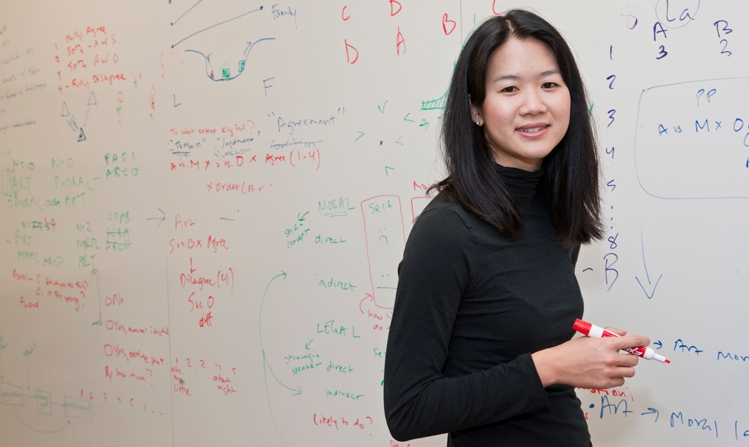
By
Assistant Professor of Psychology Liane Young has won a multi-year research grant and a prestigious academic honor that will support her study of brain activity and related decision-making in populations of people with autism, and provide a valuable research opportunity for Boston College undergraduates.
Young, who joined the faculty last fall, was awarded a three-year grant from the New York-based Dana Foundation Brain and Immuno-Imaging program to launch the research project on campus and was also named a Dana Neuroscience Scholar – one of four highly promising new career investigators to be so honored by the foundation. The scholar designation includes additional funding for Young’s research work.
The Dana Foundation is a private philanthropic organization that supports brain research through grants and educates the public about the successes and potential of that research.
“All of the research in my lab is focused on moral psychology and moral neuroscience,” said Young, who will include undergraduate students in her research teams. “Mostly we use functional magnetic resonance imaging to scan people’s brains to look at correlations between brain activity and the kinds of moral judgments that people make.”
Young says her work will examine neural and behavioral patterns in typical populations — like BC undergraduates — during moral decision-making and then compare these patterns to what is observed in populations of high-functioning adults with autism.
“Individuals with autism have been shown to have impairments in social interaction, and it has been hypothesized that the source of these social difficulties is an impairment in what psychologists call ‘theory of mind,’” Young said. “Typically healthy people have no problems thinking about the thoughts of other people. For example, I may engage in theory of mind when I talk to someone to figure out what they think about what I’m saying.
“There’s been a lot of work in cognitive and social neuroscience showing that specific brain regions support our ability to do this. We have found some abnormal patterns in high-functioning autism with respect to theory of mind and moral decision-making. We will be building on this work in the current research.
"Autism and moral judgment are both so complex that there are a million ways to go,” she said. “Social interaction is also such a rich domain that it is going to take a lot to figure out how all of these factors interact in autism.”
Young says five undergraduate students are already taking part in her research, and hopes to include more in the neural aspects of the project.



